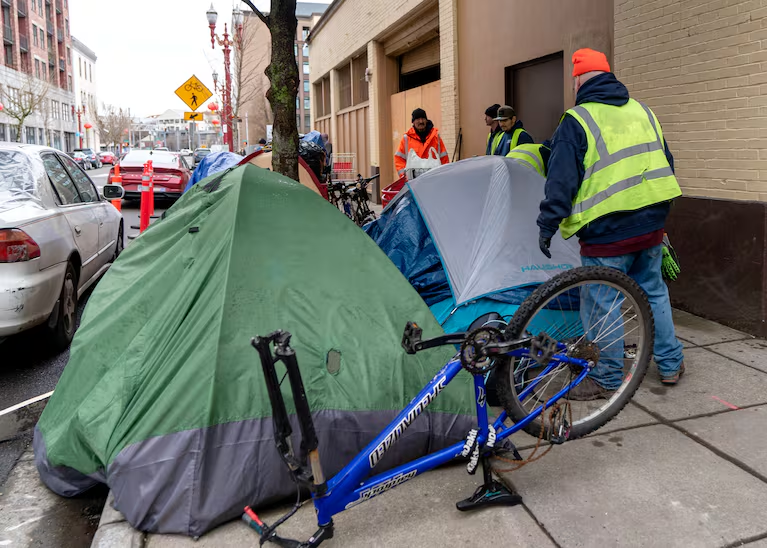Budget negotiations at Portland City Hall have revealed a deep divide between Mayor Keith Wilson and several city councilors over how to address the city’s homelessness crisis. With just weeks left before the mayor’s self-imposed December 1 deadline to end unsheltered homelessness, the debate centers on whether Portland should continue funding its homeless camp removal program—or shift resources toward direct housing and social support.
A Clash Over Priorities
Mayor Wilson came into office earlier this year with an ambitious plan to eliminate unsheltered homelessness in Portland. His strategy involved opening new shelters quickly while enforcing a citywide camping ban. For much of the year, the council allowed Wilson to move forward with little interference. But as the budget review approaches, some councilors are questioning both the effectiveness and ethics of his approach.
Councilor Angelita Morillo has proposed a $4.3 million cut to the city’s Impact Reduction Program—the department responsible for clearing homeless encampments and removing trash from public spaces. She suggests reallocating those funds to housing, food aid, small business support, and immigration services.
Also Read
“We have a lot of people who are suffering right now,” Morillo told OPB. “And I am not seeing that the mayor’s shelter plan is going to adequately alleviate that suffering. Our office feels the need to act.”
Councilor Mitch Green, co-sponsoring the amendment, added: “Portland cannot sweep its way out of this crisis. Millions have been spent on sweeps and temporary shelters, and the result is more death, more suffering, and more people on the streets.”
Budget Strains Intensify the Debate
The midyear budget process, usually a routine adjustment, is more contentious this year because the city faces an unexpected $20 million shortfall due to declining business tax revenue. That leaves little flexibility for large funding shifts.
Mayor Wilson’s office argues that now is not the time for major budget overhauls.
“When we went into the last budget process, that involved an enormous amount of community input and planning,” said Taylor Zajonc, Wilson’s spokesperson. “Disrupting a funding stream mid-year has an outsized impact on the services we can offer.”
Originally, the Impact Reduction Program had a $16.6 million budget, but after losing state funding for highway cleanups, it dropped to about $14 million. Morillo’s proposed cuts would remove nearly 30% of the remaining funds.
Wilson warned that this would effectively reduce services by 75%, given that the city is already halfway through the fiscal year. He also warned that up to 100 workers could lose their jobs and that the city might fail to collect 4 million pounds of trash and biohazards from public areas.
Political and Public Fallout
In a weekend newsletter, Mayor Wilson described the proposed cuts as “devastating for every neighborhood” and urged residents to pressure city councilors to reject them. His plea found support among several business and neighborhood associations, which have begun mobilizing against the proposal.
Morillo, however, criticized the mayor’s public campaigning. “I would like for him to express some maturity by picking up the phone when the legislative branch is making certain decisions,” she said. “That’s his role as the executive branch—to execute our vision.”
The tension highlights a growing political rift between the mayor and the council’s progressive caucus, particularly regarding how homelessness should be handled.
Criticism of the Mayor’s Camping Ban
Councilors Morillo and Green have also condemned the mayor’s recent enforcement of the city’s camping ban, which penalizes people for sleeping on public property. Since November 1, police have issued at least seven citations and arrested roughly 40 unhoused individuals with outstanding warrants.
“Attempts to police our way out of poverty have been a catastrophically poor investment,” said Green.
Councilor Jamie Dunphy, representing East Portland, observed that enforcement has merely shifted encampments into neighborhoods already struggling with poverty. “The Mayor isn’t solving a problem,” Dunphy said. “He’s forcing it into the areas suffering the most.”
Councilor Candace Avalos echoed Dunphy’s criticism, noting that the city’s current approach risks deepening inequality rather than resolving homelessness.
Defending the Mayor’s Plan
The mayor’s office insists that cutting the camp removal budget would undo progress. “It wouldn’t just delay the outcomes we’re looking for—it would reverse the gains we’ve already made,” said spokesperson Zajonc.
Wilson’s administration has pointed to several recently opened shelters, including the Salvation Army Female Emergency Shelter (SAFES), as key to reducing street homelessness. SAFES currently houses 100 women and is part of a network of shelters that Wilson views as critical to his December 1 goal.
Council Divided Ahead of Vote
The upcoming Wednesday vote on Morillo’s proposal will test where each councilor stands.
Councilors Olivia Clark, Eric Zimmerman, and Dan Ryan have expressed strong support for the mayor’s current strategy and oppose cutting the Impact Reduction Program. Councilor Steve Novick said he also opposes the proposal, citing polling that shows Portlanders favor funding camp removals over additional shelter spending.
Only Councilor Loretta Smith, outside the progressive bloc, has publicly supported Morillo’s plan. Smith argued that the reallocation would strengthen rent and food assistance programs while offsetting uncertainty around federal funding.
“We don’t know what’s happening at the federal level,” Smith said. “This puts rent assistance and food assistance front and center. I’m for that.”
A City at a Crossroads
The debate underscores a larger philosophical divide in Portland’s government: whether the city should focus on removing camps or removing the need for them.
For Wilson, the answer lies in stricter enforcement and expanding shelters. For Morillo and her allies, it lies in redirecting funds to root causes like housing, poverty, and health care.
With public opinion sharply split, the Wednesday vote may not just determine one line item in the city’s budget—it could define Portland’s broader strategy on homelessness for years to come.












